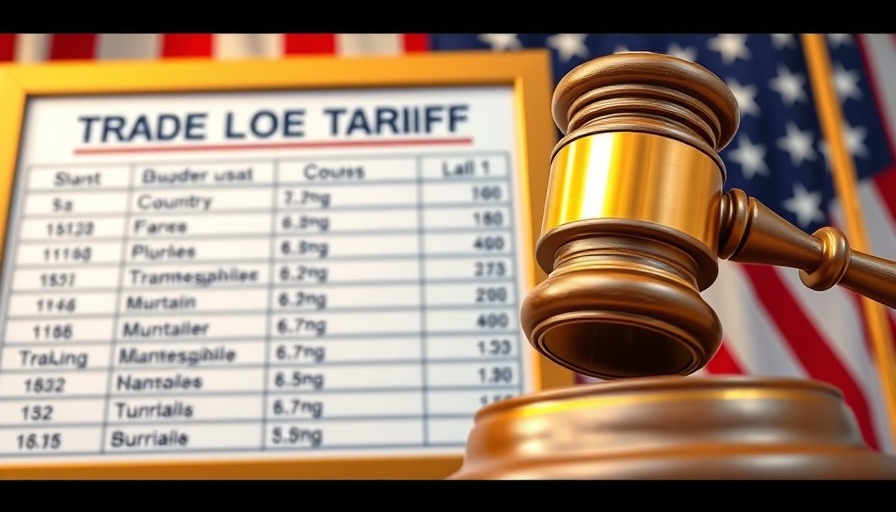
An Unexpected Twist: The Legal Landscape of Trump's Tariffs
In a surprising turn of events, former President Trump's tariffs have encountered a formidable opponent: a federal judge wielding the Constitution. The Court of International Trade's recent ruling has sparked significant debates about the legality of Trump's aggressive tariff policies. This legal challenge is not just a judicial battle; it carries potential implications reaching far beyond the courtroom.
In Trump Tariffs CANCELLED!? What You NEED To Know!!, the discussion dives into the judicial battle against Trump's tariffs, exploring insights that sparked a deeper analysis on our end.
This case questions the fundamental authority of the President to impose tariffs under the International Emergency Economic Powers Act (IEEPA). The courts have indicated that declaring an emergency does not automatically grant the executive branch the power to tax arbitrarily. As the legal proceedings unfold, concerns are rising over what this means for American businesses and consumers, and whether this could lead to a precedent that dramatically alters the balance of power between Congress and the Presidency.
The Impact of Tariffs on the Economy
As tariffs have been imposed, thousands of importers have faced significant financial burdens, collectively contributing at least $159 billion to the federal treasury. Should the Supreme Court uphold the appellate ruling, a refund on these tariffs could potentially reach up to $1 trillion, a figure Treasury Secretary Scott Bessant has dubbed unrealistic. This prospect looms large over the economy, signaling both a potential financial boon for companies and a substantial fiscal headache for the government.
From an economic standpoint, ending these tariffs could alleviate some inflationary pressures, with calculations estimating annual savings of around $1,600 for U.S. households. However, the refund mechanism implies that consumers, who initially absorbed the price hikes, will receive nothing in return. This highlights a critical disconnect in economic policy; companies benefiting from refunds may inadvertently ignore the financial strain placed on consumers.
Legal Precedents and Constitutional Challenges
The heart of the matter lies in whether Trump's administration can legitimately use the IEEPA to impose tariffs. Historically, this Act was designed to empower the President during national emergencies but was never intended to serve as a means for stateside economic manipulation. The Federal Circuit has voiced strong opinions against such interpretations, cautioning that permitting this might result in unchecked presidential power over economic policies—essentially a blank check for future administrations.
The judicial scrutiny will explore the applicability of the non-delegation doctrine, which asserts that Congress must retain control of its taxing power. Allowing a President to circumvent Congress under the guise of an 'emergency' undermines the foundational principles of democracy and governance.
Potential Outcomes: What Lies Ahead?
As the Supreme Court gears up to hear arguments in November, uncertainty looms for businesses across various sectors. Multiple possible outcomes could unfold. If the tariffs are struck down, markets could experience an immediate rally, as consumer confidence and corporate margins spring back. This outcome presents an appealing scenario for traders and investors anticipating a rebound in stocks that have been dampened by tariff costs.
Conversely, if the Supreme Court validates Trump's use of emergency powers to impose tariffs, it could set a worrying precedent, arguably handing future administrations vast powers to enact financial regulations without legislative consent. Such an expansion of executive power could redefine the relationship between international trade policy and domestic laws, steering the nation toward a mode of economic governance characterized by uncertainty.
Broader Implications for Global Trade
Internationally, the stakes are just as high. Countries that have faced tariffs under Trump's administration, particularly China, are already re-evaluating their economic strategies. Should these tariffs remain, retaliatory measures from foreign governments could become a new norm, further complicating global commerce relations. Additionally, ongoing negotiations for trade agreements could be jeopardized as nations reassess their positions in light of U.S. tariff policies.
From a market perspective, traders must navigate the unpredictable landscape created by regulatory changes, particularly as firms grapple with supply chain disruptions and inflationary pressures. The uncertainty surrounding tariff legality complicates pricing for imports, and many companies are understandably hesitant to commit to contracts amid evolving legal interpretations.
Calls to Action: What Investors Should Consider
With such fluctuating market sentiments, it's vital for investors to keep abreast of trends and judicial outcomes related to tariffs. As analysts parse through announcements and examine the practical implications of tariffs on market strategies, informed decision-making will be key to navigating what lies ahead.
To deepen your understanding of the implications of these developments, consider exploring resources offered by the Coin Bureau. Educational webinars, expert interviews, and comprehensive research tools are essential for investors looking to thrive in the unpredictable crypto and economic landscape. Stay informed, rein in your trading psychology, and strategize wisely amidst this tumultuous legal era.
 Add Row
Add Row  Add
Add 




Write A Comment